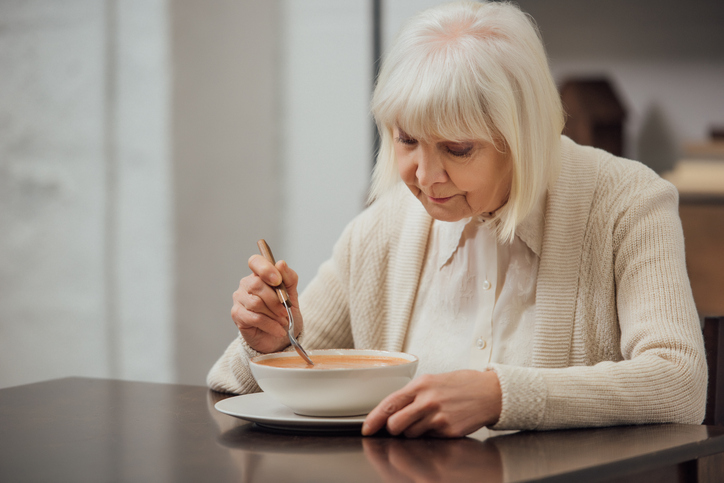
The key to managing loss of appetite in older loved ones is to understand the underlying causes.
You have just made a large batch of Mom’s special chili recipe. The house smells delectable, and you can’t wait to dig in. However, while you’re delighting in not merely the taste but the memories the meal conjures, Mom is simply stirring the food around in her bowl. And it’s not the first time. Recently, her desire for food is decreasing, and it’s beginning to concern you.
What Causes Loss of Appetite in Older Loved Ones?
Loss of appetite in older loved ones is in fact quite common for a variety of reasons, including:
- Loss of smell or taste that makes food less appealing
- Depression and/or grief
- Feeling as though they’ve lost control over other aspects of life
- Problems with chewing, swallowing, or self-feeding
- A routine that doesn’t include regular mealtimes
- Dehydration
- Difficulty with preparing meals
- Loneliness and having no one to share meals with
- A sedentary lifestyle
It is critical to first get in touch with the person’s doctor and dentist to rule out any health conditions or medication side effects that may be causing the problem. When it’s confirmed that there isn’t a medical reason for the change in appetite, try these tips to help restore the senior’s joy in eating for optimum nutrition.
- Provide high-calorie foods in small quantities. As opposed to three large meals per day, try smaller portions more frequently. You can still make larger amounts of favorite dishes, splitting them up into individual helpings which can be frozen and reheated. Other foods to try that will supply necessary nutrients include cheese, peanut butter or other nut butters, finely chopped meat or eggs, avocado, yogurt, diced fruit, and whole milk.
- Incorporate softer options. During the summer when fruit is especially appealing, try mixing up some healthy smoothies. Summer can also be a great time for milk shakes, ice cream, and frozen yogurt. Make it more festive and fun by inviting your family over to make their own custom treats and enjoying them outdoors together.
- Create a schedule. As opposed to waiting until the person says they’re hungry, designate times every day and adhere to a schedule for meals. It might take some testing to figure out the best schedule, but give the new routine some time to work before fine-tuning. Be sure the person’s routine includes an adequate amount of physical activity and exercise as well, which helps to improve appetite.
- Adapt foods and utensils accordingly. If self-feeding is difficult, there are a variety of adaptive utensils to explore. You can also make eating easier by serving food that is cut into small, bite-size portions, as well as finger foods like string cheese, chicken tenders, fish sticks, sandwiches, etc.
At-Home Care Company is here to help older adults conquer challenges to eating healthy with dedicated in-home care services. We can assist with grocery shopping, supply motivation to stay physically active, and provide friendly companionship during mealtime to make it more fun. Get in touch with us at 515-292-2650 for more information on how we can help a person you know in Huxley, Boone, Nevada, or one of the surrounding Central Iowa communities.
